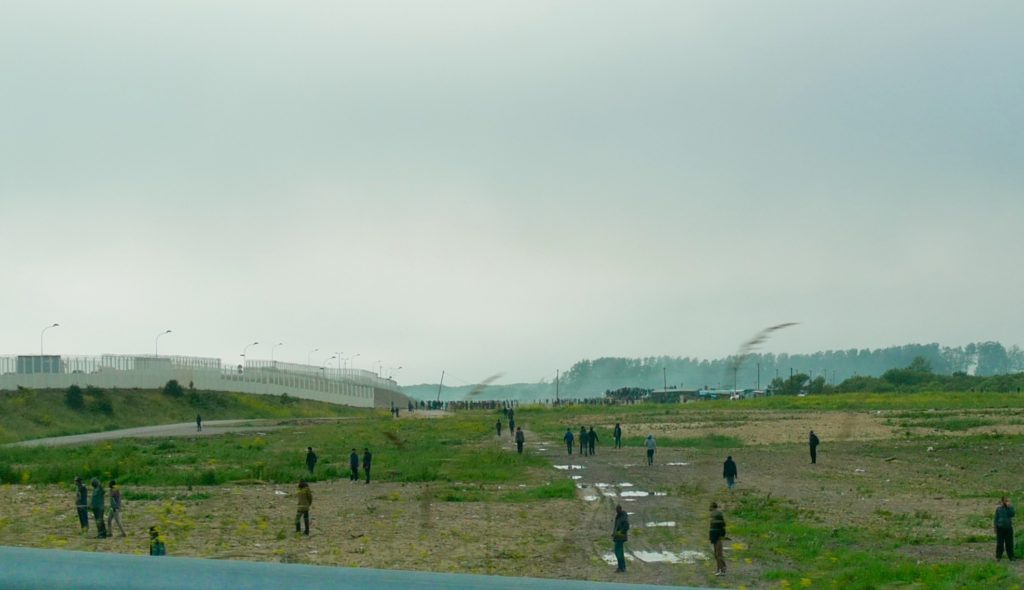(For Part I, click here.) Once we had been waved through, we had to decide which of two dirt roads was the more passable in order to get to the small cluster of makeshift buildings marked by a couple of signs saying "Ecole" or "School" on the edge of the camp. There were a few other cars parked, all with French license plates. Our eyes landed on a white, middle-aged woman talking to a handful of dark-skinned migrants. She was a local volunteer, giving several hours per week to teach French to anyone who asks. It was immediately evident that she has given her heart and soul for the people of the Jungle as she answered our questions. It is in many respects a small city. Although there are some tents, many of the dwellings are makeshift houses, although that word is really saying too much. There are shops, of sorts. (As you look at the photos, remember all our observations were from just outside the camp.)
There are a lot of reasons the Jungle feels different. For one thing, none of the camps we visited in Athens come close to the number of people all in one place. But the biggest distinction is that the migrants at the jungle can almost SMELL their desired destination, just 33 kilometers (20.5 miles) away. That makes their quest seem a little more dramatic and perhaps a little more urgent, with almost daily attempts at hopping a truck.
We were chatting with Dominique, the first French volunteer teacher we met at the school, when we were invited inside for a video presentation by a young lady from a performance art company from the city of Nantes. She does advance publicity for a traveling street performance called Long Ma, or “horse dragon” in Chinese. The company builds huge mechanical figures in the form of a horse dragon and a giant spider, and they draw huge crowds on the streets of European cities as well as on other continents. It was her idea to interest as many of the Jungle inhabitants as possible, which we agreed would be a great diversion from their daily existence in the camp. When she found out I was a French teacher, she asked if I would be willing to interpret for her in English. I found myself wishing that more from the camp had heard about the presentation, but I’m sure the word about the street show traveled.
After the presentation, we were standing back outside when we suddenly saw and felt our first ever tear gas attack. All of us were immediately seized with burning and tearing eyes, coughing, and stinging nostrils. Becky and I thought about making a run for the car, but quickly realized that would be no escape. So we ran back into the makeshift schoolroom to wait out the worst of the gas and its effects. The French volunteers were saying they had never experienced tear gas in all their time of coming here.
And yet, it is apparently not all that uncommon. The riot police have their orders: to contain the migrants in the camp and prevent them from attempting any more stowaways. As we eventually got in the car to leave, the visual was striking: the police in full riot gear in a face-off with several dozen migrants. I was reminded of the video a Palestinian refugee from Syria showed me in Athens of Turkish police with knives boarding the inflatable boat they were in with orders to puncture the boats. Like the French riot police, they were following orders to stop the flow of migrants leaving their shores.
In spite of the contrasts between what we experienced in Greece and France, the parallels are undeniable. The great majority have crossed water under perilous circumstances, be it the Aegean or the Mediterranean. Most of them have someone waiting for them in a prosperous European country, having gone ahead to seek a better life. And most of them still in the camps have nothing left.
Our oldest son and his brother-in-law, also a dear friend of ours, wrote a song about the plight of the refugees in this latest wave of the past year to two years. I leave you with a rough audio recording, along with the lyrics, below.
We did not come away from our experiences with specific ideas or strong opinions about what should be done to stop the Syrian war, or solutions for solving the massive challenge facing Europe at this time. What we did come away with is a renewed awareness of the senselessness of war, as well as not one but dozens of stories — stories that put a face on this crisis and have left an indelible impression on us. We know we cannot remain indifferent — including to those in our own city.
[audio m4a="http://daviddurham.org/wp-content/uploads/2016/06/Row.m4a"][/audio]
"Row"
by Jonathan Durham and Brian Beise
So the plan has changed, so we quit the land,
So we lost our home, I still have your hand
So the dark is deep, and our vessel shakes,
I will call your name, and the day will break
See there's the sunlight; it was never really gone
It's travelled far and it has farther still to go
The wind has died but we will set our sails, love
There is no tide so we will row
So waves of our friends crash onto the shore
Everyday we choose another last resort
So the borders close and the waters rise
We will ride these boards and find the sea's good side
See there's the sunlight; it was never really gone
It's travelled far and it has farther still to go
The wind has died but we will set our sails, love
There is no tide so we will row
We haul on frozen ropes, salt-soaked to the bone
But when you say my name you and I are home
(c) 2015 Brian Beise and Jonathan Durham





